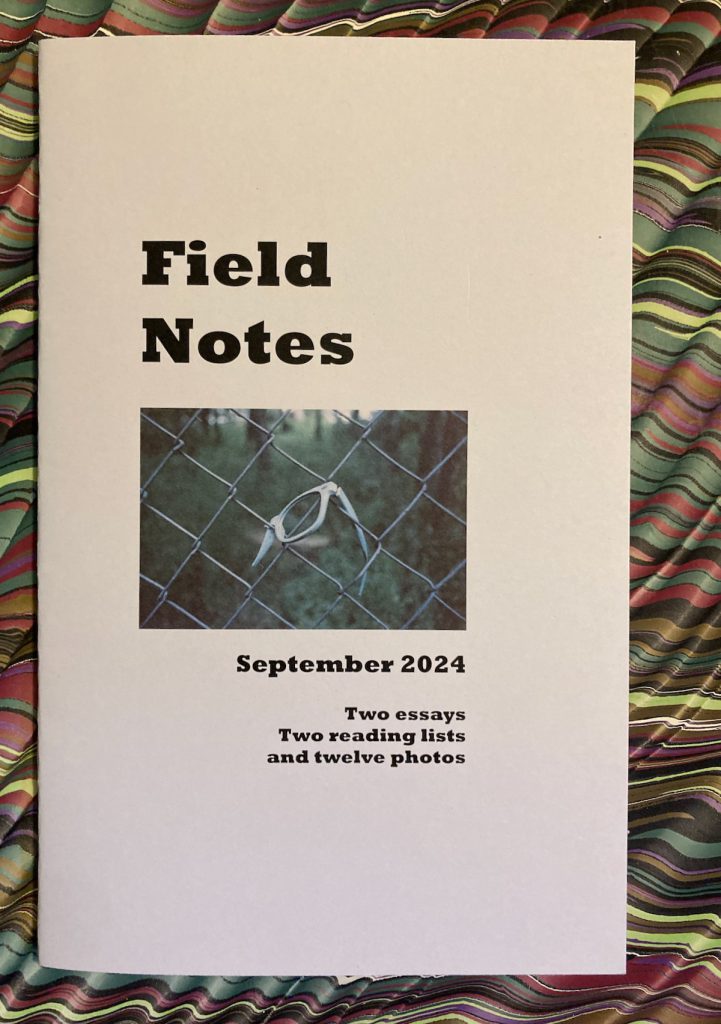A fun trip down to Austin to see old friends, attend Armadillocon, make new friends, eat good vegan food, and, as usual, look at books. (This is one of those postcards that gets mailed after leaving the place.) I hadn’t been to Austin or Armadillocon for several years, so it was good to be back. A curator friend recommended a vegan sushi place Nori. I headed there after our meeting and was impressed by the Katana-ya (deep-fried nori roll with avocado, cucumber, kanpyo, shoga, surimi mix; topped with wasabi mayo, unagi, ponzu green salad, jalapeño, red onion, and cilantro). The convention was in the same hotel as before, an odd, anonymous late 1970s exurban architectural mode that could have been at the edge of Anywhere, USA. Inside, though, it was all Armadillocon, a small friendly convention with a good mix of panels and readings (even sometimes forcing one to make hard choices).
One of the reasons I went was to show up at the Howard Waldrop celebration, a panel moderated by Scott A. Cupp and also including Sanford Allen, Robert Taylor, and Don Webb: all friends who knew Howard for decades. I hadn’t been able to attend the Waldrop Memorial in June; I was glad to attend this gathering. Towards the end of the allotted hour (the anecdotes and yarns could have gone on for hours), when the floor was open for comments, I stood up and said something like this:
My name is Henry Wessells and I’m from New Jersey, where we also esteem Howard Waldrop. He excelled at integrating incompatible ideas into improbable fictions that suddenly reveal truths about life, literature, and America; and the stories equally suddenly show themselves to be inevitable and essential parts of American literature. If “The Ugly Chickens” is often mentioned as Howard’s best known story, for me his masterpiece is “Heart of Whitenesse”, where the ambitious conceit is executed with perfect skill. Not a word out of place, and the madcap humor is controlled in the service of the tale.
I have it from a reliable source that as an angler Howard practiced catch and release, and thus understood the impossibility of clinging to things. And so we now mark his departure; the stories, and the ideas, remain.

— Christopher Brown. Field Notes. September 2024. [Austin, 7 September 2024]. Gift of the author, inscribed, one of the first copies out of the box. Two essays, two reading lists, and twelve photos. Newsletter for advance orders to his new book.
——. A Natural History of Empty Lots. Timber Press, [September 2024]. Advance copy, inscribed.
—. Live to Build a Better World. Despair, Survival, and Hope in Science Fiction’s Response to Environmental Change. [Introduction by Jeremy Brett]. Texas A&M University Libraries, 2021. Illustrated catalogue for the exhibition at the Cushing Memorial Library (January to June 2021). An interesting selection of mostly twenty-first century books and films, with the earliest titles being The Lorax (1971), by Dr. Seuss, Brunner’s The Sheep Look up and Le Guin’s The Word for World is Forest (both 1972), and Octavia Butler’s The Parable of the Sower (1993).
— Avram Davidson. The Avram Davidson Treasury. Tor, [1998]. Book club edition which I hadn’t known existed. The copyright page is altered, the dust jacket carries no price and has a number slug on the back panel, and the black boards are smooth.
— Delilah S. Dawson. Bloom. Titan, [2023].
— Joe R. Lansdale. Things Get Ugly. The Best Crime Stories of Joe R. Lansdale. [Introduction by S. A. Cosby]. Tachyon, [2023].
— Josh Rountree. Death Aesthetic. Underwood, [2024].
——. The Legend of Charlie Fish. Tachyon, [2023].
— John Varley. The Persistence of Vision. [Introduction by Algis Budrys] [1978]. Dell [Quantum Paperback], [1979]. Varley was the first Armadillocon guest of honor.
— Howard Waldrop. Howard Who?. Stories [1986]. Peapod Classics. [Small Beer Press, third printing, 30 March 2024] [replacement copy].
